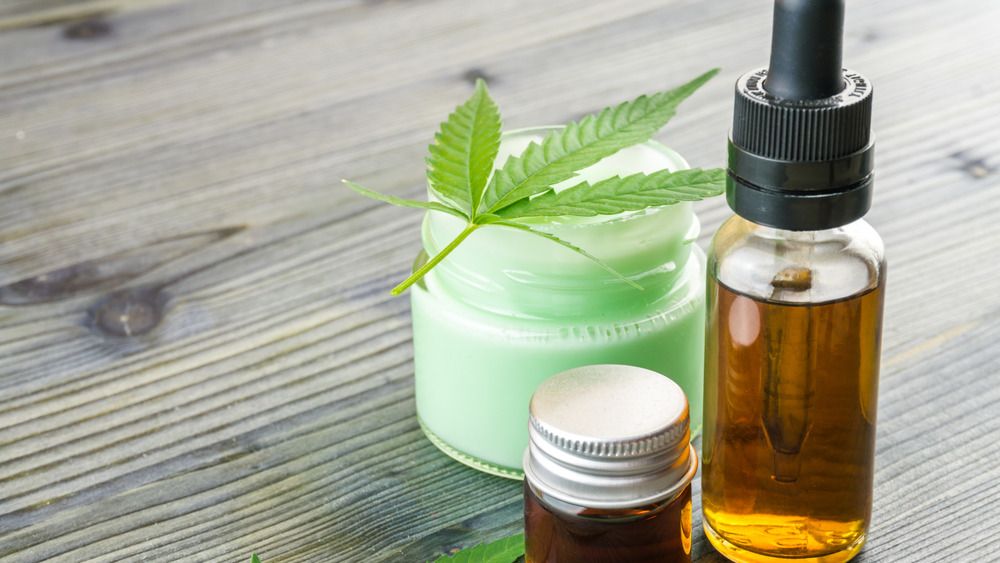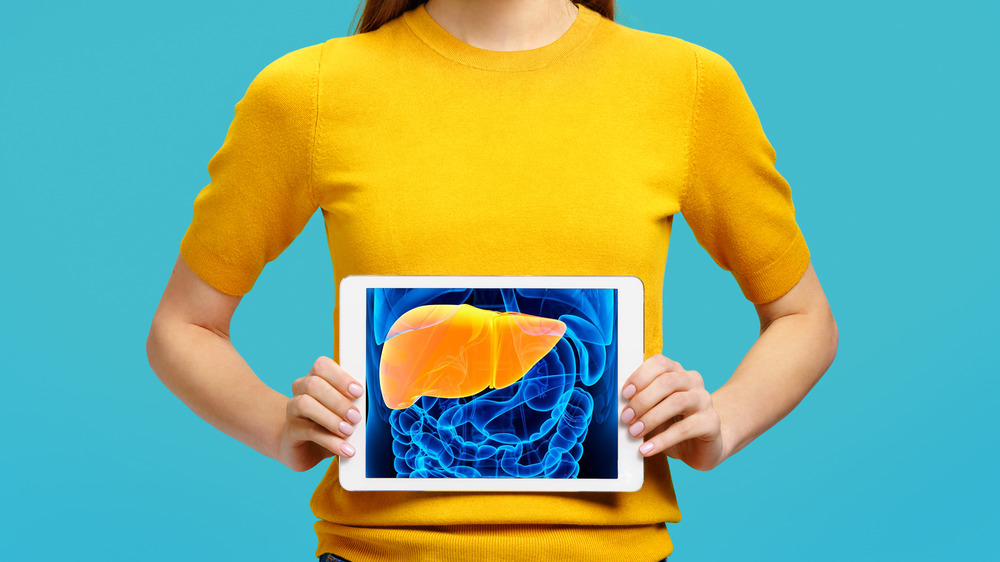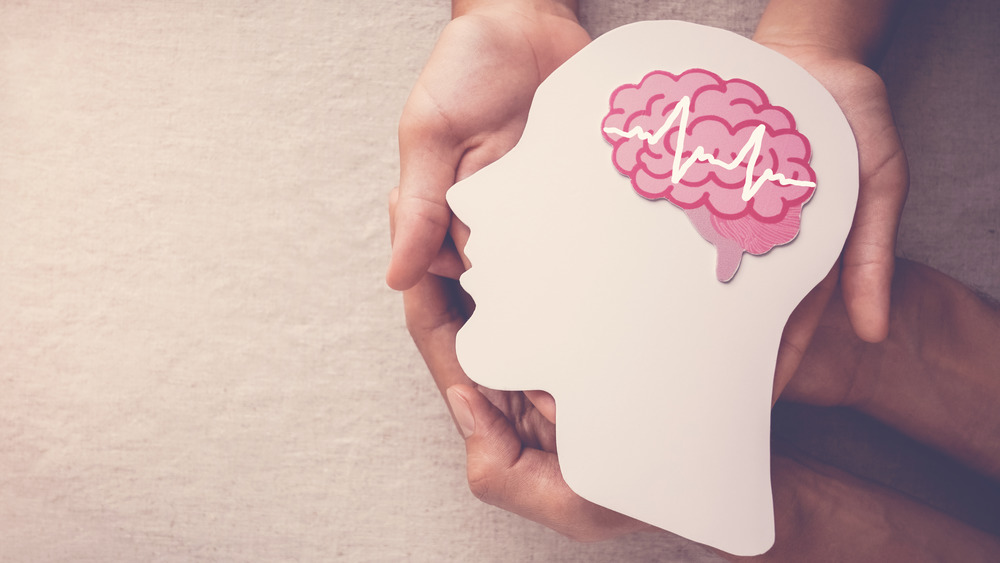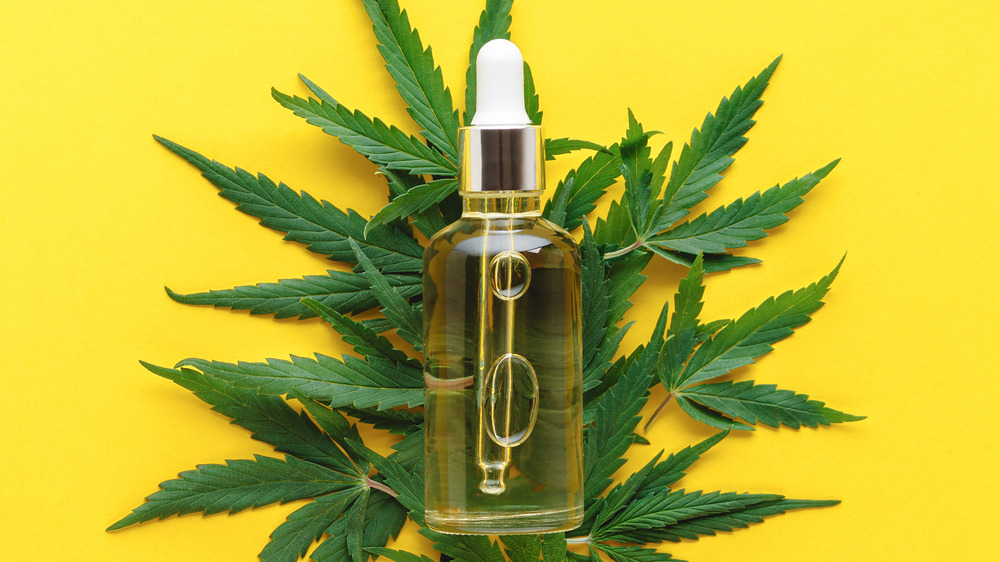What Really Happens To Your Body When You Use CBD Every Day
Cannabidiol (CBD) and THC may come from the same Cannabis sativa plant, but they couldn't be more opposite of each other. Healthline says the major difference is that unlike THC found in marijuana, CBD doesn't get you high. But it does carry mental and physical health benefits.
CBD works by interacting with the endocannabinoid system in your brain. Healthline says the chemical structure of CBD tricks the brain into thinking it's one of its own chemicals. It releases a series of messages to several brain areas involved in sleep, pain modulation, and more when it binds to a receptor in the endocannabinoid system.
Like anything you put into your body, the Mayo Clinic says there are some side-effects, but it's relatively safe when you follow the recommended amounts. When you're curious to try CBD or a long-time veteran, it's always good to know how using CBD can affect your body.
Your mental health improves
CBD may be a non-pharmaceutical approach to taking care of your mental health. A 2020 review in the Journal of Cannabis Research reported CBD products effectively reduced anxiety, schizophrenia, bipolar disorder, PTSD, and more. CBD use reduced PTSD symptoms in adults and helped with insomnia by decreasing the frequency of nightmares, according to a 2019 study. A small 2010 study published in the Journal of Psychopharmacology found CBD relieved symptoms of social anxiety disorder by reducing activation in many emotional centers of the brain and increasing activation in the right posterior cingulate gyrus.
However, it's too soon to start considering a CBD a one-stop-shop for all your mental health needs. Indeed, a 2015 review also supported CBD use for a spectrum for anxiety disorders. Although the review authors note that most CBD research on anxiety has been preclinical, with human research limited to smaller dosings. According to the Anxiety & Depression Association of America, there is not enough research to justify CBD use for anxiety and depression. But it's not something they're ruling out as potentially valuable for the future.
You feel less pain
If you're feeling chronic pain, there's no need to suffer in silence. The Arthritis Foundation says it is possible CBD can relieve pain and reduce inflammation in the body. While more research is needed to give a clinical recommendation for CBD use, the Arthritis Foundation says that people who have used CBD reported improved symptoms, better sleep, and less anxiety. In addition, a 2018 review of past trial cannabis studies found CBD provided pain relief for neuropathic pain by more than 50 percent.
A 2020 review in Frontiers in Pharmacology reports there is preliminary evidence that using CBD could help with alleviating pain symptoms. This likely occurs through its interactions with receptors involved in inflammation. However, the researchers also say that since CBD products are not regulated by the U.S. Food and Drug Administration (FDA), current CBD products could hold potentially toxic compounds and be unsafe for certain groups such as pregnant women.
No, CBD does not cause liver damage
Can CBD cause liver damage? The claim arose when a 2019 study published in the journal Molecules found liver toxicity in mice after 24 hours of being given high amounts of CBD. However, some experts disagree with the study's findings.
"The huge popularity of cannabidiol, a non-intoxicating component of cannabis, has helped to destigmatize the plant and restore its reputation as an important medicinal herb. But bogus science and inept reporting continue to distort how we understand the benefits and risks of CBD and cannabis," Adrian Devitt-Lee, Ph.D. candidate and chief science writer for Project CBD, told Forbes. Likewise, Healthline reports that the liver damage observed in the study is unlikely to occur because the CBD dosages go beyond the therapeutic doses of CBD used in humans. "Many people know that taking too much ibuprofen or Tylenol can have detrimental consequences. CBD is no different." Diana Martins-Welch, MD, a physician in palliative medicine at Northwell Health, told Healthline.
Indeed, further studies have disproved this finding. A 2020 review found only a low risk for liver damage at high CBD doses and a protective effect for the liver at low CBD doses.
Taking CBD may give you clearer skin
Everyone wants clear skin, and CBD has the tools to help achieve this dream. According to Medical News Today, CBD has been effective against acne because of its anti-inflammatory properties. When it reduces the amount of inflammation in the body, it also lowers the amount of sebum — an oily substance in the skin that contains fat and cellular waste. Less sebum translates to fewer pimples to cover up.
While the research is still ongoing, there are a few studies to back up these statements. A 2014 study in The Journal of Clinical Investigation found CBD helped lower the production of sebocytes which help create sebum and, eventually, acne. If that's not all, a 2019 study found CBD ointment helped to reduce inflammation in people with chronic skin diseases. While the research on CBD and skin conditions looks promising, the American Academy of Dermatology Association says it's too early for CBD products to be claiming it can definitely treat acne, rosacea, or psoriasis.
CBD affects cravings and weight loss
While exercise and a healthy balanced diet are the most essential in promoting weight loss, CBD may help make the weight loss journey more bearable. According to Healthline, CBD could potentially promote weight loss by boosting your metabolism and reducing your appetite. A 2018 study found the cannabinoid system in the brain decreases cravings when the CB2 receptor is stimulated. Healthline also says CBD could promote brown fat cells — a good fat that burns off calories by creating heat for the body and is more seen in people with healthy weights.
But the jury is still out on CBD's effect on weight loss, and taking it could backfire #weightlossgoals. While CBD may not cause the munchies like taking marijuana, it could stimulate appetite a different way. "CBD helps relieve nausea and can calm your nervous system and digestive tract. If you feel less nauseated, you may eat more. CBD also quells pain, and feeling less pain may also boost appetite," Janice Newell Bissex, a registered dietitian and holistic cannabis practitioner, told The Washington Post.
CBD helps you sleep better at night
Nothing beats a good night's sleep than a warm blanket and some CBD. According to the American Sleep Association, CBD influences the endocannabinoid system in the brain several to promote sleep. While the mechanism of how CBD causes rest is still unknown, they suggest CBD helps induce sleep and reduce insomnia by interacting with receptors involved with the sleep/wake cycle.
Since anxiety and pain can stop you from falling asleep, an alternative explanation is that CBD may be promoting sleep by decreasing those levels. Indeed, a 2019 study had patients in a psychiatric clinic use CBD because of anxiety and difficulty sleeping. They observed 79.2 percent of patients showed lower anxiety levels and a 66.7 percent improvement in their sleep. Additionally, a 2018 review published in Frontiers in Pharmacology reported CBD is effective in reducing chronic pain. The reduction in chronic pain was associated with better sleep and mood.
CBD may serve as an additional treatment for diabetes
If you have Type 2 diabetes, CBD can help — and seems to be already helping a lot of people with this disease. A 2020 study in Drug and Alcohol Dependence found people with diabetes increased their CBD or THC use by 340 percent in the past 30 days.
"In general, especially if they're not well controlled, people are looking at cannabinoid therapy as an alternative, and usually as an adjunct option," Heather Jackson, the founder and board president of Realm of Caring, told Everyday Health.
According to Everyday Health, people with diabetes are rubbing CBD oil on their feet to relieve pain. People using CBD are reporting less nerve pain, improvements in blood sugar levels, and an increase in sleeping. That being said, Everyday Health says the U.S. Food and Drug Administration has not approved or regulated any CBD product. As a result, people with diabetes need to be careful when they purchase CBD. A 2017 study in JAMA found 26 percent of CBD products purchased online had less CBD than what was stated in the label.
CBD helps with seizures
In 2018, the U.S. Food and Drug Administration (FDA) approved the use of the cannabidiol Epidiolex for epilepsy treatment in patients over the age of two. The approval marked the first time CBD would legally be prescribed as treatment. "This approval serves as a reminder that advancing sound development programs that properly evaluate active ingredients contained in marijuana can lead to important medical therapies. And, the FDA is committed to this kind of careful scientific research and drug development," Scott Gottlieb, the FDA Commissioner, said in an FDA press release.
According to Healthline, there is a lot of clinical research supporting the use of CBD oil for seizures. They reported that the approved CBD drug Epidiolex effectively lowered the number of seizures associated with Lennox-Gastaut syndrome. The same drug was also beneficial for a rare form of epilepsy that doesn't respond well to medication.
Healthline says Epidiolex should be started at 2.5 mg/kg per day and then bumped up to 5 mg/kg twice per day.
CBD helps promote long-term brain health
CBD doesn't have the power to make you smarter, but it can help keep your brain strong and healthy. By prioritizing your brain health, you may be reducing your chances of developing a neurological disorder. According to mbghealth, CBD can regulate the expression of genes that have been linked to developing Alzheimer's. In addition, Dementia Care Central says CBD can decrease inflammation in the brain, which slows down the rate of dying brain cells. Since inflammation is a major source of Alzheimer's disease, symptoms and can be alleviated using CBD oil. CBD also exerts antioxidant properties and has been linked to helping with memory loss and slowing the decline of several brain areas.
CBD could also be a potential treatment for other neurological conditions in the future. A 2012 review published in Current Pharmaceutical Design found that CBD helped people with schizophrenia by mimicking the effects an antipsychotic has on the brain's striatum and temporal cortex. A 2014 study in the Journal of Psychopharmacology found CBD improved people's quality of life with Parkinson's disease.
CBD helps with heart health
CBD has captured the hearts of millions of users, possibly by affecting their hearts. The British Heart Foundation cautions that CBD research on the heart is still in its early stages, but it looks promising. They say CBD's anti-inflammatory properties could protect the heart as inflammation is associated with coronary heart disease, high blood pressure, and stroke. The American Heart Association says, unlike marijuana, CBD has been linked to a healthy heart. By reducing inflammation, CBD could decrease the risk for atherosclerosis, which narrows the arteries and blocks blood flow to and from the heart.
Indeed, a 2013 review in the British Journal of Clinical Pharmacology reported CBD's anti-inflammatory and antioxidant properties also protect the heart from potential damage. CBD also promoted blood flow to the heart and reduced the heart's response to a stressful event. A 2017 study found a single dose of CBD reduced resting blood pressure and reduced the spike in blood pressure and heart rate when a person is subjected to stress.
Using CBD reduces nausea and suppresses vomiting
Have an upset stomach? Try a dose of CBD. A 2011 study in the British Journal of Pharmacology found CBD contains anti-nausea effects that suppress vomiting. According to Medical News Today, CBD works to reduce nausea by regulating serotonin receptors. While serotonin is associated as the "happy hormone," it's also the underlying culprit for your nausea. Healthline explains that an increase in serotonin stimulates the body to push out food that's causing an upset stomach and activates brain areas involved in promoting nausea.
The nausea relief provided by CBD is helpful for people experiencing chronic gastrointestinal issues. A 2016 review reported CBD was effective in managing nausea symptoms for people with cancer undergoing chemotherapy.
A different Healthline article says that THC might work better than CBD as an anti-nausea treatment. For this reason, they recommend using full-spectrum CBD because it contains both CBD and up to .3 percent of THC.
CBD may help with curbing drug addiction
When Linkin Park sang "Breaking the Habit," they weren't referring to using CBD, but they might as well have. Science shows CBD can help addicts reduce their drug cravings. A 2013 study in Addictive Behaviors found that CBD reduced the number of weekly cigarettes used by regular smokers. Additionally, a 2018 study found that smokers taking CBD paid less attention to cigarette-related stimuli that would likely increase their urge to smoke again.
CBD isn't just for smokers. A 2015 review reported CBD reduced addictive behaviors involving opioid, cocaine, and psychostimulant drugs. It also helped people recovering from cannabis and tobacco addiction. In fact, there's evidence of CBD helping people recovering from drug addiction. A 2019 study in The American Journal of Psychiatry found that a 3-day exposure to CBD reduced drug craving and anxiety from people who became recently abstinent from heroin use. CBD also helped with lowering heart rate and stress levels that could act as drug cues.
CBD helps manage your gut health
Before there was Pepto Bismol, there was CBD. CBD used as a digestive medicine that could also treat diarrhea and colic was reported as early as 1000 B.C. in India, according to a 2006 review in the Brazilian Journal of Psychiatry. While the main purpose of CBD has changed, scientists continue to show evidence of its benefits to the GI tract.
A 2019 review reported that CBD helps manage GI symptoms associated with inflammatory bowel disease — although there appears to be no improvement in altering disease activity. Researchers from a 2018 study published in Inflammatory Bowel Diseases suggest CBD extract could reduce gut irritation associated with ulcerative colitis. Participants with ulcerative colitis showed less severe symptoms and appeared to have a greater quality-of-life. According to Project CBD, there is scientific evidence linking CBD use with promoting healthy bacteria — that help protect against dangerous pathogens and digestion — in the gut microbiome.
CBD reverses the unwanted side-effects of marijuana
CBD's psychoactive cousin, marijuana, has some undesired side-effects. Luckily, CBD is there to lend a hand. A 2011 review in the British Journal of Pharmacology notes that CBD helped lower marijuana after-effects of creating hunger and anxiety.
Additionally, in a 2010 study published in the Journal of Pain and Symptom Management, people felt less anxiety when taking CBD and THC together than THC alone. A 2015 study reported CBD oil was beneficial in maintaining abstinence from marijuana, reducing anxiety symptoms, and promoting better sleep in a single patient. If that's not all, a 2019 study in the Journal of Neuroscience found CBD helped counteract psychiatric side-effects people feel when they get high.
Healthline warns combining CBD and marijuana could backfire as both come with their own set of side-effects. They say people should start with a low dose of both products — about 5 milligrams of THC and 5 to 15 milligrams for CBD — and then increase the amount as needed.















